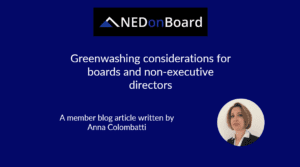Not too long ago, many non-executive directors, or NEDs, played more of a ceremonial role in the board rather than a truly functional one. Many were appointed by senior executives simply to add some gravitas to a board, without toppling the applecart.
However, the role and responsibilities of non-executive directors are rapidly changing. The days when a non-executive director could turn up for a company’s board meeting, offer a few valuable nuggets of wisdom drawn from their vast experience then disappear for a month are long gone. The fact that NEDs have always borne the same legal and fiduciary responsibilities as executive directors has tended to fly under the radar of many board members. But this is now changing.
The new non-executive director
The global economic crisis of 2008 and subsequent lengthy recession made many companies and their investors start demanding that every penny they invested demonstrate a tangible ROI. The contribution of NEDs to a company’s success started being scrutinised more closely. Consequently, NED selection processes have become much more rigorous and candidates are drawn from more diverse backgrounds. NEDs are being held more accountable, and are expected to commit more of their time and expertise sometimes at no extra pay.
Shift in focus
A Harvey Nash NED Survey 2014/2015 yielded some important insights into how the roles played by NEDs are changing. According to the survey, 92% of NEDs surveyed reported that a huge part of board meetings time was dedicated to discussing corporate governance and risk, thus outstripping 43% who reported that current financial performance was top priority. This shift in priorities by boards is reflected in the constitution of NEDs. Even though NEDs with a financial background still make up the largest percentage of new appointments (27%), NEDs with a background in corporate strategy is not far behind with 21% of new appointments falling into this category. This is hardly surprising considering that the global economic meltdown of 2008 was brought about by poor risk management in the first place. Boards are demanding that NEDs play a more pro-active role in identifying corporate risks and give the requisite advice how to manage such risks. Interestingly, the survey found that just 1% of new NED appointments had a background in IT, indicating a shift from ten years ago when executives with an IT background were all the rage.
The survey also revealed that 35% of NEDs were surprised by the huge amount of unpaid time commitments demanded from modern-day NEDs.
More demanding roles
The Harvey Nash survey revealed that only 4% of board chairs were ‘‘very satisfied’’ with the talent pool of their non-executives, with the vast majority – 61% – reporting that they were moderately satisfied. This indicates that there currently exists a skills gap in non-executive directors that boards are increasingly becoming aware of.
Some enlightened companies are consenting to their executives to act as NEDs in other organisations, such as non-profit and academia, more than before. This move is not entirely benign, but rather is being done to give young executives a chance to gain the requisite skills and experience. Bringing in more people from diverse backgrounds is also helping to increase the diversity of thinking that is critical for an effective board.
All these NED trends are expected to accelerate going forward.
What has stayed the same?
Nonetheless, some things have not shown much change. More than half of all NEDs are still aged 56-65 years, with majority being men. Less than 3% of NEDs are aged 36-45 years, indicating just how critically important experience is to the position.
The NED of the future
The building momentum in the NED landscape will pick more steam in the future. Individual NEDS need to take more responsibility in preparing themselves for non-executive roles. Organisations should be clearer on what they need a NED to accomplish and should seek to diversify their NED talent pool to get the most from NEDs. Needless to say, the cronyism that was rampant during NED appointments in the past can no longer be tolerated. Keep up to date and find your next role.
To develop further your knowledge and skills and qualify as a professional NED, please visit our training page and register your attendance to upcoming events.




